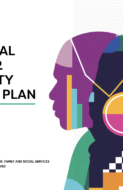The Government’s National Gender Equality Action Plan (GEAP) 2022 – 2026 was developed with a focus on five main policy areas; Leadership and Governance, Economic Empowerment, Institutional Gender Mainstreaming, Elimination of Gender-Based Violence, and Access to Justice.
The legal framework for gender equality in the Maldives was strengthened through the enactment of the Gender Equality Act (Law No. 18/2016), which prohibits direct and indirect gender-based discrimination, and the duties and responsibilities of State institutions and other relevant parties to achieve gender quality in the country. The 2019 amendment to the Decentralization Act (Law No. 7/2010) established a 33% electoral quota for women in local councils, setting a precedent and facilitated women’s increased meaningful participation in public life and governance.
However, the Maldives is considerably behind in attaining the Sustainable Development Goals (SDGs), with SDG Goal 5 (Gender Equality) having a stagnant score, indicating major challenges that persist in achieving gender equality.
